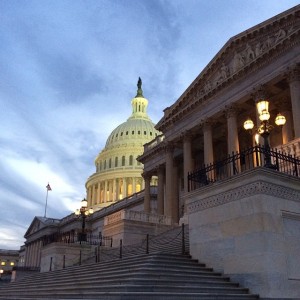On the Hill: Four Bills Congress Needs to Pass before the End of 2014
With the 2014 congressional elections fast approaching, Congress is on yet another recess, this one lasting until November 12. In these five weeks Representatives and Senators will meet with their constituents, check in on their district and state offices, and make some last minute appeals for re-election to their base.
After Congress returns to Washington they will only have about fifteen days for legislative work. And while intense partisanship has stopped Congress from passing legislation throughout most of this year, perhaps when the elections are over, the 113th Congress can put their political posturing aside and get to work on passing some important legislation that has languished up until this point but remains important to humanists.
The first of these bills, the Repealing Ineffective and Incomplete Abstinence-Only Program Funding Act, amends the Social Security Act to “eliminate the abstinence-only education program, rescind [related] program appropriations, and reprogram such rescinded appropriations for the personal responsibility education program (PREP).” This bill takes the money that the federal government gives for abstinence-only education and instead uses that money to fund comprehensive and medically accurate sexual education. Unfortunately, after the bill was introduced by Rep. Barbara Lee (D-CA) it was relegated to a congressional subcommittee, where it continues to sit even though it is co-sponsored by over twenty-five other Representatives. This legislation could do a lot of good in reducing the number of teen pregnancies, which, while lower than past years, remains a problem with over 300,000 babies born to teens in 2012 alone.
The Supreme Court’s recent decision to allow appellate court rulings which legalized gay marriages in five states to go forward has once again re-focused national attention on LGBTQ rights. Congress (and the House of Representatives specifically) could do a lot of good by passing the Employment Non-Discrimination Act (ENDA), which updates federal anti-discrimination statutes to prevent employees from being discriminated against because of their sexual orientation or gender identity. This bill has already passed the U.S. Senate, and the House version of the bill is currently in a congressional subcommittee with over 206 co-sponsors. Not only should Congress pass this bill, it should move to amend the bill before passage so that its provisions granting exemptions from ENDA to religiously-affiliated businesses are stripped.
On the topic of religious exemptions, Congress should also work to pass the Protect Women’s Health from Corporate Interference Act, which would stop employers from using the infamous Hobby Lobby ruling to deny contraceptive coverage to their employees. This ruling allows some business owners with certain religious beliefs to be exempt from a provision in the Affordable Care Act which requires employers to provide health plans that include contraception coverage to their employees. This bill has yet to pass either the Senate or the House, and has inflamed Religious Right activists, which is usually a good sign that the bill should be supported by humanists and progressive religious Americans alike.
Since Congress will return just after the mid-term elections have been completed, voting will still be fresh on the minds of countless Senators and Representatives. That’s why the following weeks would be a prime opportunity for Congress to consider passing the Voting Rights Amendment Act, which has bipartisan support and would update the original Voting Rights Act, a provision of which was struck down recently by the Supreme Court in Shelby County v. Holder. The Voting Rights Amendment Act would deal with the Court’s concerns and could also strike down and prevent future discriminatory state voting laws, many of which would disenfranchise minority groups and other marginalized communities. Dozens of discriminatory voting laws already exist in states across the country, all of which make voting a much more difficult process than it should be. Many of these laws could be challenged and eventually removed if the Voting Rights Amendment Act is passed.
The American public’s faith in Congress is at an all-time low, but the institution can restore itself if it takes some time after the elections to pass these important bills and display a sense of bi-partisan pragmatism. Whether or not Republicans and Democrats are willing to put aside their grievances for a moment and actually do this is another question entirely, but cynicism about our political system should not prevent humanists from encouraging their elected representatives to work on passing these important bills.

